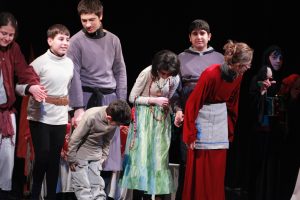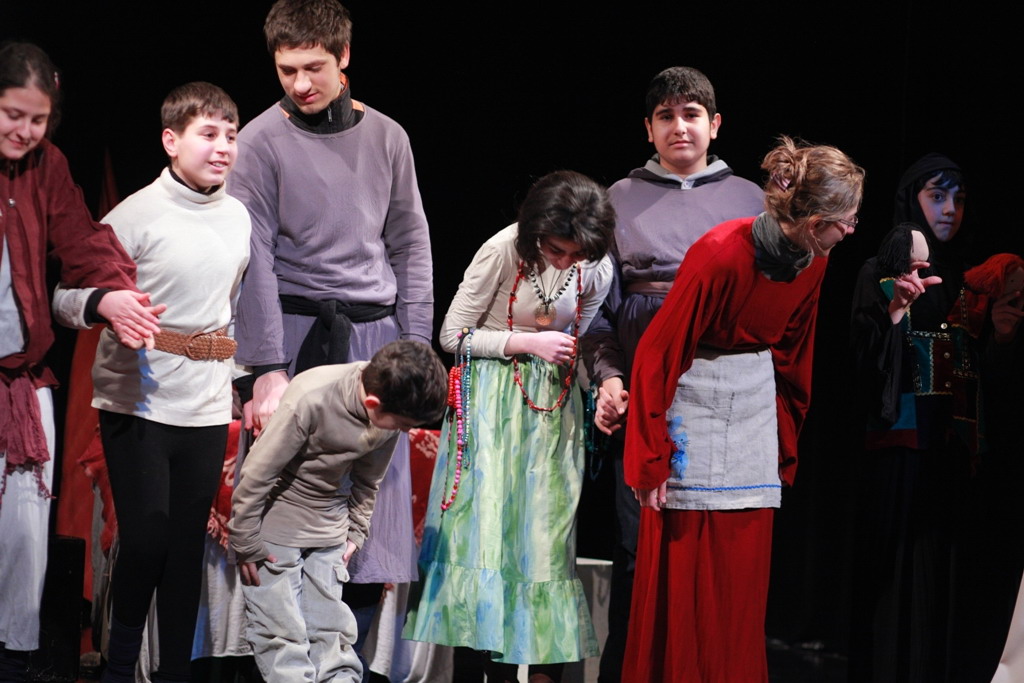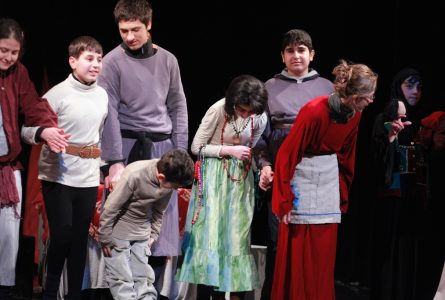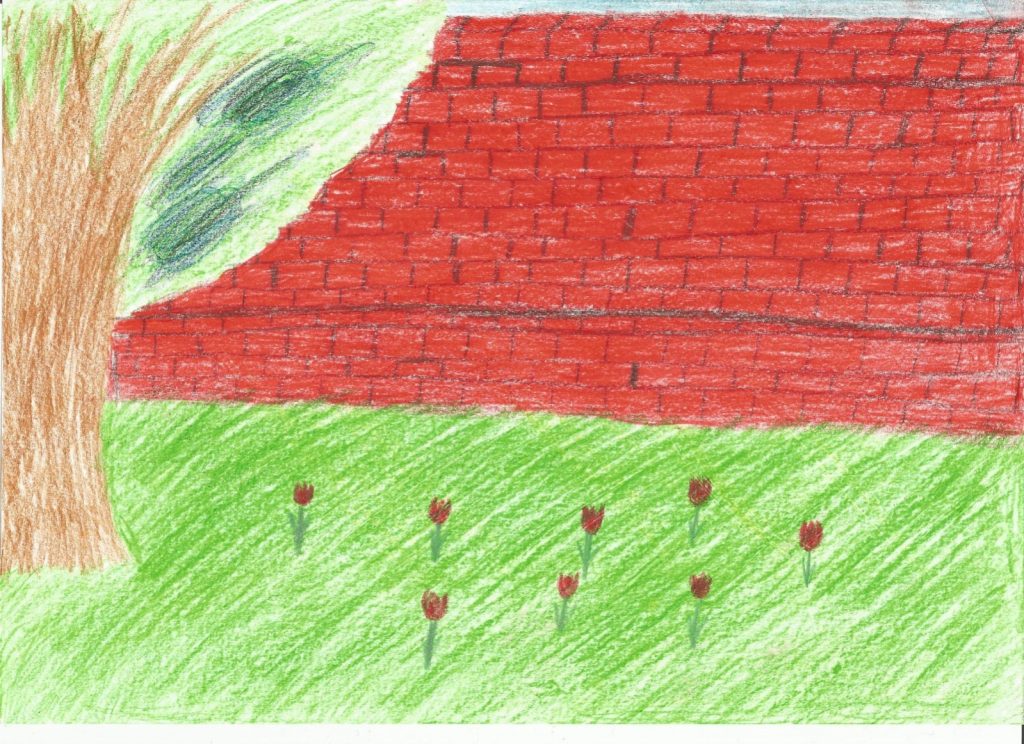The author describes the preliminary results of the ‘Theatre project for children with problems in development.’ She gives the analyses of children’s behaviour during the rehearsals and premiere of the play based on Grimm brothers’ fairy tale “The Elves and the Shoemaker”

The concept of social integration of handicapped children has been in the focus of attention of scientists and social workers for more than a century. In the past, every kind of retardation in development pushed them out from the mainstream. Once having pushed them out, the society now tries to reintegrate such children, clearly realizing the necessity of that process. It is not accidentally that the process is called «integration», which means unification of previously separate parts and elements of a system into a whole on the basis of cooperation interaction) and inter supplement.
But any defect can be a starting point and the main driving force of mental development of an individual. This is the general rule of the mental life. However, it is obvious, that this rule becomes explicit only when the person realizes the obstacle. The realization of the obstacle is possible when the developmental lag becomes obvious for the “ordinary people”. Only then would the disabled children understand their problems and the pain, connected with their disability and the above-mentioned rule will come into force. Obviously, this could happen if we really, not formally regard them as personalities and we would be able to provide a guidance to be followed for them.
The implementation of the integrative method in the sphere of education has had a profound history. We are trying to prove its effectiveness, engaging children in arts activities, especially in theatrical performances.
Theatre is an integrative kind of art. Theatre is a form of fine art, that involves speech, movement und vocal training during the rehearsals. Theatre staging presupposes a significant work of actors regarding speech, movement, and music art. Besides, it involves music, light and color effects as well as art of stage decor. And this means that while preparing for the theatrical performance the participants feel the effect of all the above-mentioned arts and very activity exercises its own unique effect on the personality. Thus, we could state that the theatre art involving handicapped children provides an opportunity to implement different types of complex artistic activities, each of which is having its own positive developmental effect.
Theatre staging is like a game with rules that develops the self-consciousness of children. Every stage character presupposes its perception, managing one’s behaviour within it, presupposes control of the impulsive movements and speech, their adjustment to corresponding situations of the given episode of the performance; the ability to coordinate one’s movements with those of other participants of the play. Participation in stage performances provides for the participants an opportunity to control one’s body, as well as paralinguistic (body language) expressive means, and to develop such mental functions as perception, memory, creativity, imagination, concentration, emotions, i.e. all the qualities that a mentally impaired child would need. The classicist of the integration system Lev Vygotsky (1896–1934) stipulated it this way: “The greatest opportunities of the development of an abnormal child lay in the sphere of highest mental functions. The lowest are connected with the elementary processes of the body, where the defect is actually rooted and overcoming them is much more difficult. It is also proven that the highest mental functions, such as thinking in concepts, memory, rational speech and others have developed not as a result of biological evolution, but as a result of the development of a man as a social being”[1].
It means that it is extremely important to have ordinary children in the same group with retarded children. During the first rehearsals disabled children just copy and imitate their friends, and they imitate them more eagerly than the grown-ups.
Theatre can engage all children, who truly like this kind of art. Good plays are able to consolidate children of different age and temperament. A creative idea is able to unite all the children and they will acquire new creative as well as social skills as a result of their implementation in the process of the performance. At first, it is possible that some disabled children, participating in the performance may be very small, depending on a depth of the deficiency degree of a particular child, on the previously acquired theatrical skills to the moment of theatrical rehearsals. At the same time, the result, the emotional evaluation of the performance itself, the applauses of audience will belong to all the participants, who contributed to the success of the performance. The success will inspire everyone to further work. It is also important to reveal the unique personality of every child, particularly of those who have problems in development. “Every development defect also gives rise to energy and stimulates desire to overcome or to soothe it. The synergy effect resultant from this impetus creates not a certain “rank and file” juvenile personality but a unique one that may find its expression in peculiar features of character.”[2] One defect or other, which is rooted in the body, prevents a disabled person from expressing himself, to open himself to the world. We will have to see individuality, occasionally protruding through the defect, and we will have to trust it and to help it to manifest itself. And those, who have worked or have got to communicate with such people, know how bright the manifestation of the triumphant personality could be.
Thus, we have chosen theatre as a kind of arts, where the personality of the actor emphasizes the uniqueness of the role performed and emotionally colours it. On a related note the greatest actors of medieval Japanese theatre could be referred to. In their opinion, a performance is nothing but a mystery of human soul.
It is also obvious that performing a role can have a deep mental impact on the actor. This means that especially in case of young people and disabled children one has to be extremely sensitive while choosing an adequate stage character. The correct choice may produce a positive therapeutic effect or the incorrect one could traumatize the juvenile mentality.
The present concept was realized as a part of the integrative programs for handicapped children of ‘The educational complex AREGNAZAN of Yerevan / Armenia’. For 16 years the school has been successfully integrating children with special needs into ordinary classes.
We have chosen several disabled children who had previously expressed their willingness to take part in a Nativity play. It was announced at school in classes with integrative children about the opportunity to take part in this performance. Four 6th graders, one 9th grader and two 11th graders were among those, who responded. Besides, one 1st grader also joined the troupe. He was looked after in a boarding class, which was just near the class where the rehearsals took place. As a whole, there were 8 ordinary children and 7 children with special needs.
The Grimm brothers’ fairy tale “The Elves and the Shoemaker” was chosen for the plot of the play. We wrote the scenario, taking into consideration the number of children we had. We added new specific characters especially for some children. The play had to be funny and joyful. The premiere play was staged in the corridor of the school. However, the success was so obvious that we made up our minds to show the performance in the “real” theatre. We rented the stage of a small theatre. The premier took place on January 13, 2012. There was not a single stoppage, children performed very smoothly with an incredible enthusiasm. The audience was delighted and applauded a lot. After this, the performance was repeated once more and had a greater success. Children were more courageous and even eager to improvise.
Below is the psychological analysis of the situation of each child with problems in development prior to their participation in theatrical classes with some conclusions:
1. A 13-year-old boy (7th grade), with unilateral cerebral palsy. He walks, he is very sociable, a bit egoistic, the intellect is preserved, he studies to the extent of his abilities. He likes theatre very much, had minor roles in the performances of the class. In our performance, the boy played the major role of the shoemaker, which he was very proud of. This fact stimulated him to active participation during the rehearsals.
2. A 12-year-old girl (6th grade) has serious speaking problems, hypersensitivity and daytime involuntary urination, difficult communication with peers, the intellect is preserved, but mental alertness is retarded to a certain extent. She positively reacted to the idea of the theatre without any hesitation. The hardest thing for her was to express herself emotionally. During the rehearsals, she felt confused, made mistakes and looked upset, but at the premier, she was in her element.
3. A young boy of 19 came to school 5 years ago from a boarding school for children withunderdevelopment problems. We did not integrate him to the class at first, as he was too aggressive. After a year of individual work, he could spend several lessons with the peers. He turned out to be very sociable, became interested in geography, history, anatomy. He came to theatrical classes only wishing to socialize. The idea of theatre was not interesting for him, even more – it frightened him. The presence of audience always paralyzed his speech and coordination and drove him to anger. Very soon he began doing certain exercises and etudes with children with great pleasure, but each time he obviously became sad because of the idea of impending performance. On the day of the premier day, he sat before his exit in the corner and angrily announced he wouldn’t perform. The persuasions of the adults produced no effect. However, unexpectedly, several children went to him and started persuading him in their own manner. He stood up and went to the stage. Next time, it was not needed to persuade him to go to the stage and he was more relaxed.
4. A 14-year-old boy, with a hard psycho-physical underdevelopment. He only shouted the first years and was not interested in anything at all. He shouted during the classes and disturbed the teaching process and that is why we stopped the integration process and started to work individually with him. A year later this young man made some progress; he was allowed to be present at some general lessons from time to time and could participate in school activities. After three years, he could read and write. During theatre classes he could not understand what was required from him. One could not observe any responsibility before the performance, however during the premiere he managed to act his part well and said the required phrases.
5. A 17-year-old girl: heavy form of epileptics, which progressed after she had suffered meningitis as a small child. She studied all her 8 years at AREGNAZAN. Two years ago she left secondary school. She joined the theatrical group, as she didn’t want to lag behind her classmates, though the idea of theatre itself was not alien for her. Because of frequent epileptic fits, we were afraid to give her a big role. Nevertheless, she played the small one also with great pleasure.
6. A 17-year-old girl was integrated in the same class as the previous girl. A serious form of psychophysical underdevelopment was observed, which however, had been cured to a certain degree. The girl did not attend theatre classes regularly because her parents had professional duties outside Yerevan, but she played the role of grandmother with great responsibility, not daring though to utter several words that she had to. She was absent for the second and third performances, because she had to leave the country with her family.
7. A 16-year-old boy with a serious form of autism. He studied all 9 years at school with his mother. The intellect is elective. He attended theatre classes with readiness, performed his role very accurately. During the second performance, he was not afraid to step down to the audience to really offer them to buy nuts during the market scene. The whole performance was led by children of 11th grade, they were also the storytellers. The 6th graders led the puppet elves and came out to the stage only after the curtain. A 9th grader girl played
only in one small market scene, but it was her who was the spiritual center of the troupe.
The responsibility of the “ordinary” children was so high before the performance that it passed over even to the disabled ones who at the beginning of the rehearsals did not realize their responsibilities during the pending performance. After a few classes they readily accepted the notices of their ordinary peers about the importance of the upcoming events. Already during the premier, the sense of responsibility was written on everybody’s faces. They all sat silently at the backstage, and despite the absence of adults there was absolute silence. They only reminded one another about the coming exit and the disabled children were accompanied to the exit.
Thus, one can conclude about the obviously positive results of theatre classes in the integrative group. Apparently, such result is due to the difference of the intellectual levels of the cast members, be they because of their age or the underdevelopment. This makes the rest more responsible, patient, caring, attentive, and ready to appreciate even the smallest achievement of the other. Here, of course, a lot depends on us, the adults, on our real attitude to work and children, on how well we can create an atmosphere, where both creative and best social qualities of participants would equally develop. We could observe an incredible unity of children on a certain idea, their expanding communication, increasing with every meeting, their attention to each other, the desire to spend time with each other even after classes, all this should be considered as a positive result of the ‘Theatre Project’.
After the performance all the parents of the participants with developmental problems stated an incredible progress in the development, which happened to their children during the theatrical classes.
[1] Lev Vygotsky: Psikhologiya iskusstva (Psychology of Art). Moscow 1924-25. v ←




